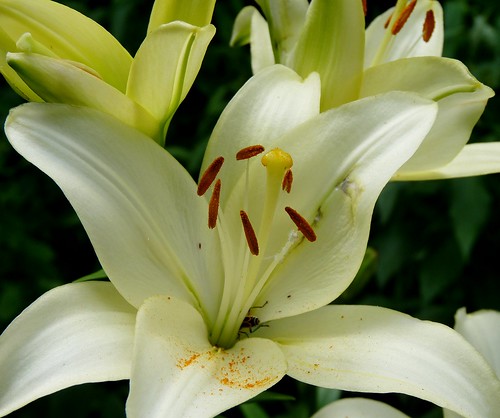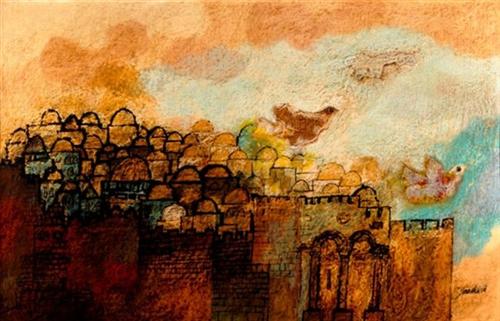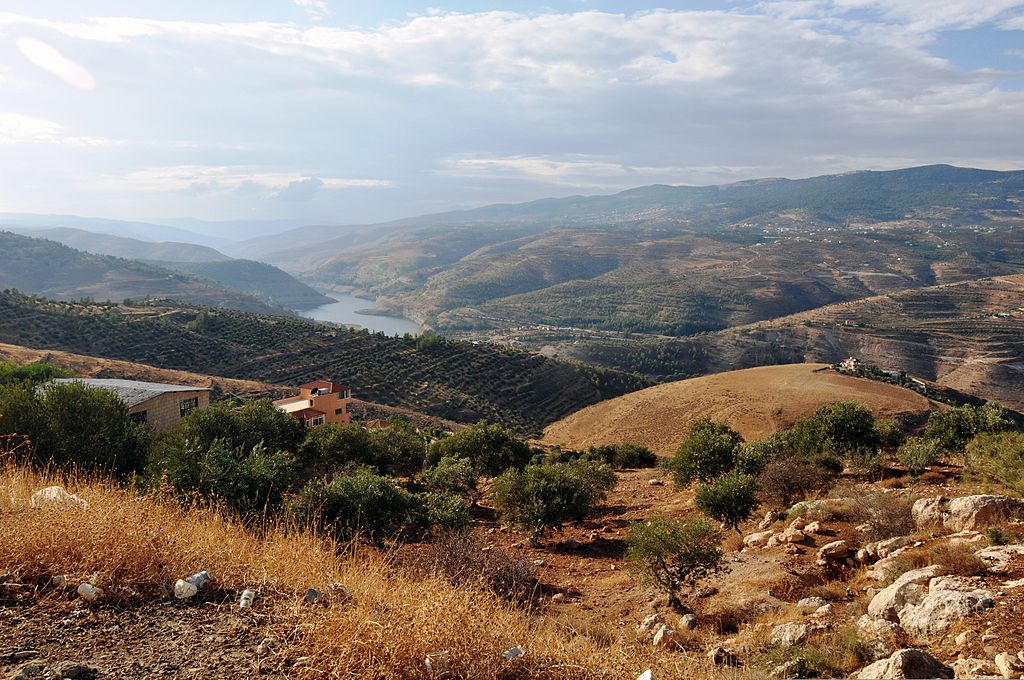(Originally delivered at Temple Israel, Shabbat morning, 3/26/2011.)
Very early Wednesday morning, my son Zev and I were up eating breakfast, listening to WNYC, and we heard the news of the bus bombing in Jerusalem. This was the first attack of this kind in four years, and such news is always very disturbing to me, because I lived in Jerusalem 11 years ago, and I rode those very buses. I find it very easy to identify with those who were there, the victims, the bystanders.
Zev, who is nearly 2, did not seem to appreciate the depth of this tragedy. I had nobody with whom to process this news, and so I kept it to myself, for the moment.
There is a big weakness in the enterprise of terrorism, a flaw that those who commit or support acts of terrorism appear not to consider very carefully. Certainly, terrorism kills people, scares many more people, and draws international attention to your cause. And these are its primary purposes.
But what terrorism does not do is bring warring sides together for the sake of reaching a peace agreement, or even a cease fire. In the case of Israel in particular, terrorist activity only strengthens the will of survivors, and of the wider, injured society. Israelis know from having lived with it forever that the way to deal with terrorists is to ignore them - to bury your dead in tears, to repair your buildings and your lives, and then to move on, if only somewhat more bitter and defiant. And the killers never seem to understand that every violent act committed against civilians diminishes the chances of any kind of peace, or at least a fair deal for the supporters of your cause, by a measurable amount.
Are Israelis, in the wake of this bombing and the dreadful killings in the settlement of Itamar two weeks ago, suddenly more eager to negotiate? Probably not. And particularly after seeing the video footage of Palestinians in Gaza celebrating the gory killing of the Fogel family by eating sweets in public.
Now, do you really think that the guys in the upper echelons of the Islamic Jihad group are thinking, “We’ve really done it this time! Now the Israelis will surely see our side of the story and, as our ally journalist Helen Thomas suggested last year, move back to Poland and Germany”? Probably not.
Perhaps there is nothing to say. Perhaps the best thing to do is move on.
Leaving acts of terrorism aside for a moment, we read this morning in
Parashat Shemini about the death of Nadav and Avihu, two sons of Aaron, the Kohen Gadol (High Priest). It is not entirely clear why God schmeisted them, although the Torah tells us that they offered “
esh zarah,” “alien fire” on the altar of the
mishkan (tabernacle). After doing so, they are consumed in a sudden, merciless flame.
Immediately following their deaths, the Torah states, in a terse, removed voice (Leviticus 10:3,
Humash Etz Hayim p. 634):
וַיִּדֹּם אַהֲרֹן.
Vayidom Aharon. Aaron was silent.
There is something that simply does not ring true in this episode. Was Aaron speechless, beyond words? Was he silent in front of his brother Moses at that moment, and then did he cry later? Was he really convinced that God’s actions were justified, and kept silent out of respect?
Rashi, trying to defend Aaron, points to a Talmudic midrash from
Massekhet Zevahim that sees Moshe comforting his brother, telling him that his sons Nadav and Avihu died only to sanctify the name of the
Qadosh Barukh Hu (God), and that he received from God a reward for his silence in the face of tragedy.
Really, how does one respond to such a line? Oh, of course! It’s a reward! I get it. I lose two out of my four sons, and I’m rewarded for being silent. Makes perfect sense!
Rashi, my friend, how could you say that? Who can be silent in the face of death? Who can be silent in the face of such a horrible loss?
And likewise, we cannot be silent in the face of the recent tragedies in Israel.
And yet, the most stunning silence is that of the Western world regarding all that has transpired across the Middle East in recent months. Let’s take a look around the Arab world:
Col. Muammar Qaddafi is at work trying to put down an all-out rebellion. How does he do it? By killing his own people. The death toll is estimated to be in the thousands.
Syrian troops are busy, probably at this very moment, trying to put down protests; in recent days they have killed perhaps 100 of their own brethren by opening their rifles at crowds of protesters.
In Bahrain, at least 10 pro-democracy protesters were killed in the past month, by Bahraini and Saudi troops. Bahrain! Not the wealthiest Persian Gulf state, but it’s not Gaza, either.
The list goes on. Yemen, where 50 anti-government protesters were gunned down last Friday. Egypt, where hundreds died for the departure of a single multi-billionaire president. And let’s not forget about the 20-year civil war in Somalia, where hundreds of thousands have died. And so forth.
Arab and Muslim states are murdering their citizens, yet outrage in the West is barely noticeable, while Israel’s detractors are in the streets after even one death caused by targeted military action against terrorist infrastructure.
Palestinian death tolls regardless, Israel continually takes a lot of heat: in the seemingly hostile world media (the
BBC had difficulty merely reporting the killings in Itamar in an accurate way; yesterday’s
New York Times article about the rockets that fell in Beersheva this week was underneath a picture NOT of the damage in Beersheva, but of a Gazan boy killed in an Israeli retaliation); there is also the ongoing effort of the BDS movement: Boycott, Divestment and Sanctions; and of course there’s the Goldstone Report. (BTW: Libya was a member of the UN Human Rights Council, when it produced this report. Go figure.)
When the IDF entered the refugee camp in the West Bank city of Jenin in 2002 to root out terrorist activity, the world screamed “massacre!” Death tolls of up to 900 were claimed by Palestinian sources. There were anti-Israel protests in major cities around the world.
In the months that followed, even Human Rights Watch (no great ally of Israel) conceded that there was no such massacre, and that there were 27 militants killed and 22 civilians. Not those deaths were insignificant, mind you, but the figure was not quite on the scale of mass graves, as charged by some.
Returning to the present killings in the Arab world, ladies and gentlemen, I ask you, where are the international protests now? Who is out in the streets for the Libyan people? Sure, we’ve gone in with fighter jets and no endgame. And in Britain anti-war groups are protesting the Western intervention.
Canadian journalist Michael Coren, comparing the Jenin non-massacre of 2002 with the events of the past two months in
an analysis for the Toronto Sun, observes,
“In the past few weeks we have seen genuine massacres and gruesome brutality. Thousands of people have now been murdered by Arab and Iranian governments and Arab and Iranian soldiers. In Libya, ordinary mourners attending the funerals of people shot dead in the streets were themselves targeted by snipers.”
Coren goes on:
“Yet where are the massive street protests in Europe’s large cities? Where are the calls to boycott countries? Where are the labour unions demanding action? Where are the student groups using words like “apartheid” and “Nazi”? Where are the moralistic editorials condemning Arab intolerance, Islamic barbarism and the need for Arab countries to be banned from international sporting, cultural and literary events?”
Elsewhere in the Torah, in the book of
Devarim (Deuteronomy 25:14,
Humash Etz Hayim p. 1135), we read the following negative commandment:
לֹא-יִהְיֶה לְךָ בְּבֵיתְךָ, אֵיפָה וְאֵיפָה: גְּדוֹלָה, וּקְטַנָּה
Lo yihyeh lekha beveitekha, eifah ve-eifah: gedolah uqtanah.
You shall not have in your house alternate measures: a larger and a smaller.
Do not weigh your produce, or perhaps your generosity, or your honesty, differently for different customers, says the Torah. In other words, no double standards. Allies or not, the authoritarian regimes of the Arab world have overstayed their tenures by a couple of decades. That their murderous attempts to maintain their grip on power goes on without the same kind of condemnation that the world heaps upon Israel is simply scandalous.
We are not permitted to be silent, like Aaron. There is no reward for complacency in the face of wanton murder by selfish dictators. There is certainly no
qiddush Hashem (sanctification of God’s name) in either the terrorist murders in Israel or the martyred protesters in the Arab world. And likewise, we should not stand for two sets of measures of world attention or condemnation.
Let me sum up with the following statement from Psalm 29 (verse 11), the words that conclude the recitation of
Birkat HaMazon, the blessings after meals:
יְהוָה--עֹז, לְעַמּוֹ יִתֵּן; יְהוָה, יְבָרֵךְ אֶת-עַמּוֹ בַשָּׁלוֹם.
Adonai oz le-amo yiten; Adonai yevarekh et amo bashalom
May God grant strength to His people; may God bless His people with peace.
Why in
Birkat HaMazon? Because the wish for peace is everpresent, even surrounding such mundane activities as eating.
But wait! Go back to the first hemistich. Strength? We like to highlight peace, but not strength. One might read this as the slogan that marked the Reagan years of the Cold War, that is, “peace through strength.” But I prefer to read it as referring to strength of will, rather than military might. May God strengthen our resolve to overcome terrorist threats and bad actors to achieve peace. And may we have the strength not to remain silent.




